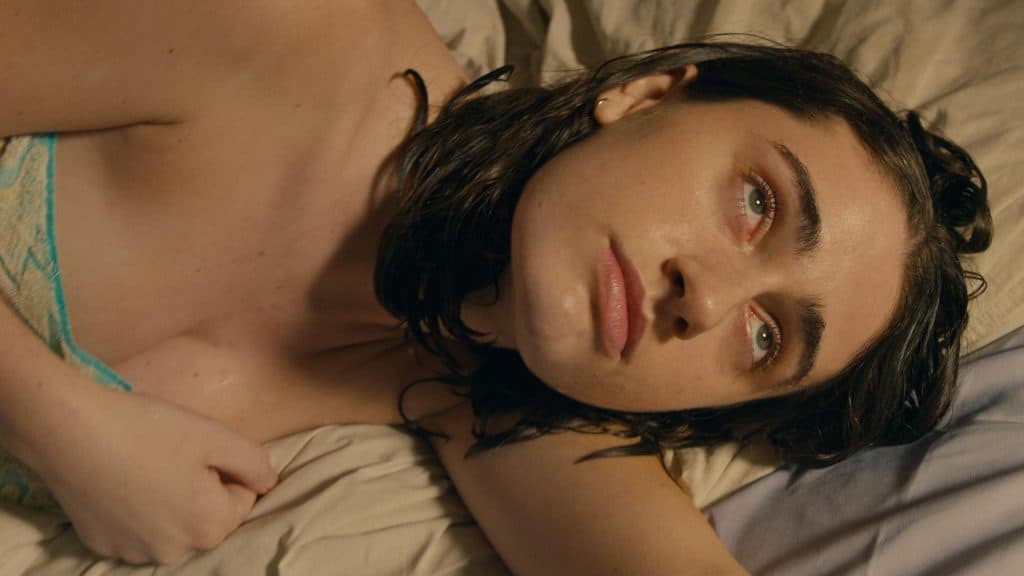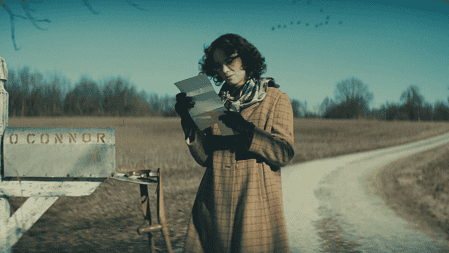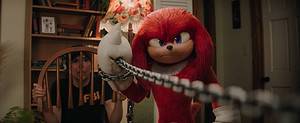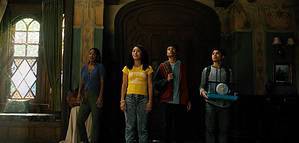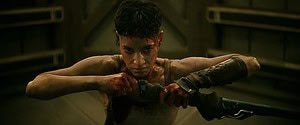For Ally Pankiw, I Used To Be Funny was an opportunity to portray an oft-explored topic in a way she had yet to see.
“When we talk about violence against women, it’s often framed as a revenge thriller or a complete collapse of a life, like pure devastation and sorrow, and that’s just not the reality,” says the Canadian director. “I wanted to talk about trauma and recovery in a new way.”
Her film, which just had its World Premiere at SXSW earlier this week, follows Sam, a young stand-up comedian struggling with PTSD and trauma recovery. On some days, Sam can muster up a shower and go back to the comedy club she used to frequent. On others, she’s stuck at home, unable to get out of bed.
“I wanted to show that healing is not linear,” says Pankiw. “There’s always going to be ups and downs in terms of recovery. Joy and despair can sometimes exist in the same moment or in the same day.”
Sam is surrounded by a strong support system, including her roommates and fellow stand-ups, her loving ex-boyfriend, and a local family she nannies for. However, she struggles to maneuver around these relationships when they are so associated with her trauma.
However, when the young girl in the family goes missing, she becomes driven to find the young girl, reconcile, and, as Pankiw describes it, “reclaim joy and connection.”
Sam is played by Rachel Sennott, queen of SXSW and star of another feature premiering at the festival, Bottoms. The two films couldn’t be any more different, but Pankiw is excited for fans to see her range as an actress. “I think a lot of people know she can do the bombastic comedy, but she’s really great dramatically too, so I’m excited for people to see that side of her. I don’t think they’ll be surprised.”
Pankiw took a break from the craziness to sit down and talk to GVN about the film, Toronto’s stand-up scene, and depression snacks. Here is that conversation, edited for length and clarity.
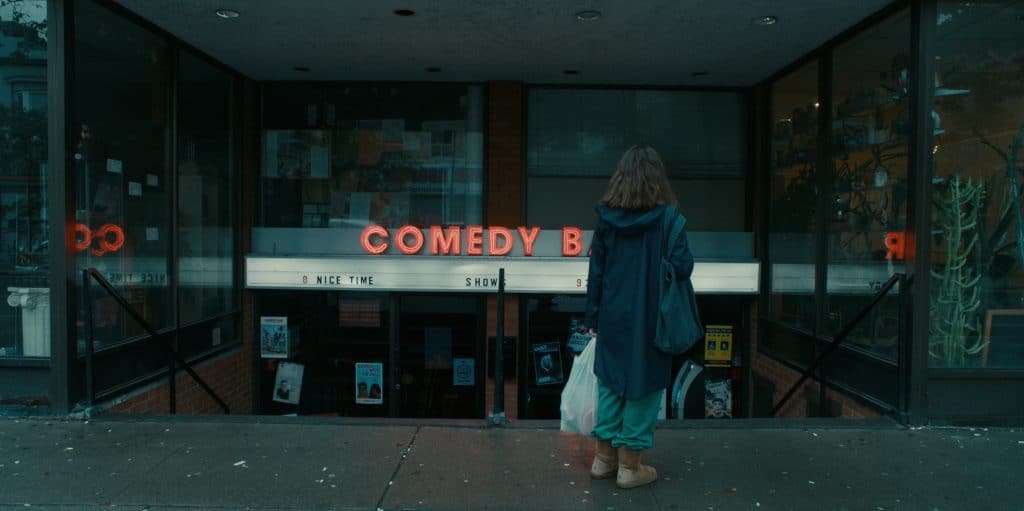
Talk to me about this story. Is it personal for you? There are so many things about the story that make it unique, so it couldn’t have just come from nowhere.
It definitely didn’t come from nowhere. I wouldn’t say that the exact plot is a personal story of mine, but the themes are very personal to me and my life and my family. I really wanted to tell a story about trauma and how it can take a whole life to recover.
This is a movie partially about the Toronto stand-up comedy scene, which is not covered in a lot in films, big or small. What is it about the Toronto stand-up scene that, in your experience, differentiates it from something like New York or LA?
I think the surprising answer is it’s not that different, it’s just not as known. A lot of beloved comedians are originally Canadian and came through Toronto. It feels close-knit and intimate because it is a smaller city than New York or LA. There’s one central hub for comedy, which is Comedy Bar. I kind of came up there. All my friends were comedians when I first moved to Toronto for university and I was at Comedy Bar the first day it ever opened. We got to shoot there too, which was lovely. There’s so much comedic talent in Canada and in Toronto specifically that I wanted to showcase it for what it is. It is on par with everywhere else in the world, it just doesn’t often get platformed.
Is one of the reasons you were able to shoot there because they were interested in having that kind of exposure?
I think so. I think a lot of the Toronto comedy scene is like, “Why aren’t we making a Fleabag in Toronto? Why aren’t we making these types of shows that are created by Canadians and shot in Canada?” A lot shoots in Canada, but it’s usually an American show. Toronto often has to play another city. It never gets to really play itself. I’ve known Gary for forever––he’s the owner of Comedy Bar––and I was, again, there opening night and have been a fan and a supporter of Comedy Bar and all the comedians who make it their home for many years. He let us shoot there for a couple of days and we definitely overtook it but hopefully left it just as nice as it was before.
That’s an interesting point talking about Canadian cinema. It feels a little elusive, I think, to a lot of American audiences.
Yeah.
One of my colleagues went to Berlinale where BlackBerry premiered––
Actually, my editor Curt Lobb cut that film as well, and he’s amazing.
Oh, amazing!
I can’t wait to see it.
One of my colleagues, when talking to Matt Johnson [the director of BlackBerry] about making a Canadian film on the world stage, he talked a lot about how there’s often a pressure for Canadian filmmakers to mold themselves around American cinema. Do you agree? Did you feel that pressure?
I just don’t think there’s that big of a difference. I think Canada’s a more socially progressive place, but I don’t find that my sensibility is necessarily any different than an American filmmaker’s sensibility. I think my film is Canadian simply because I’m Canadian and I made it, but I think there’s a lot of pressure to compete against American content. If someone in North America is choosing between an American film that has a bunch of stars in it, because America has a star system, or a Canadian film that’s full of a lot of people they don’t know, I think they’ll often gravitate towards the film where they know the people in the film. I think it’s more about that pressure. I don’t find the sensibilities of Canadian and American films that different, personally.
I’m only just starting to now kind of dive into Canadian cinema. I do find that people are just less bothered generally, or there’s less of a heightened effect.
Yeah, I think there’s less social anxiety in general when everyone has universal healthcare and not everyone has a gun. Kids in Canada can just go to school and not worry about school shootings.
Very true.
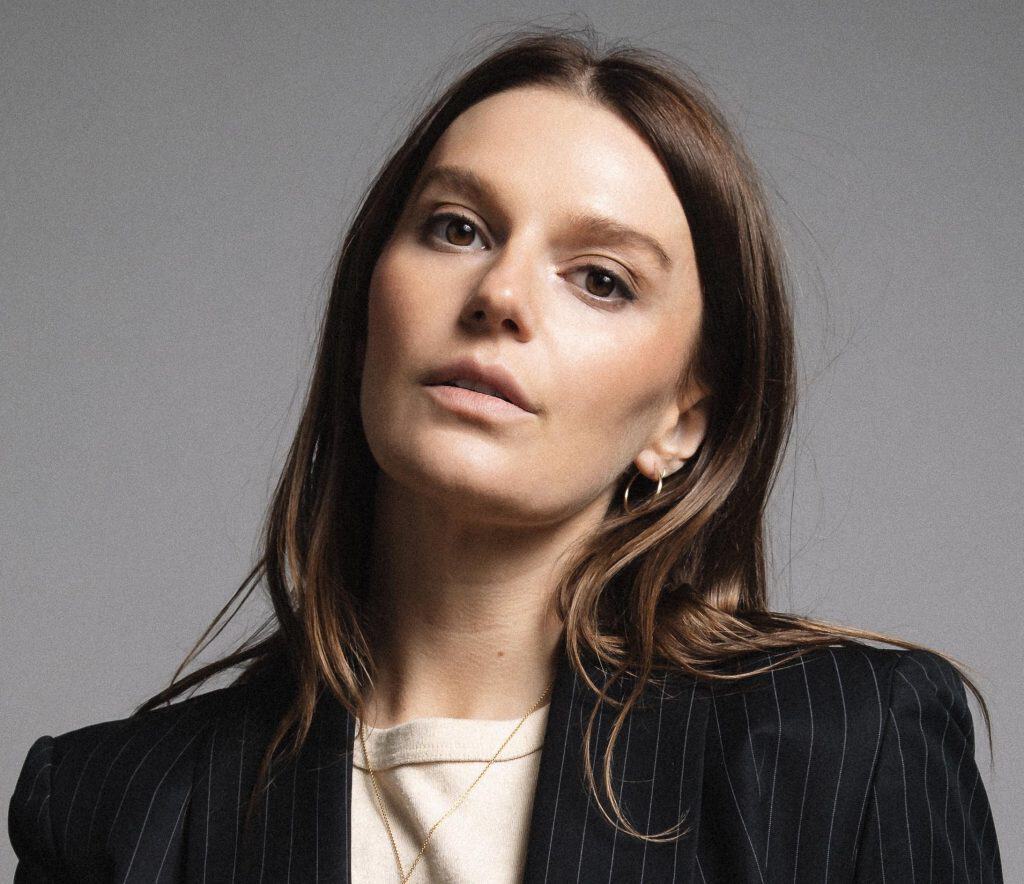
I will say this about Canadian sensibility. I have found one difference that I know of, which is that Canada feels like a nice hybrid between British and American comedy. I’ve shot a lot of TV in London and the UK and British comedy is very dry and like, “Don’t look at me.” American comedy is very arrogant and really in your face––in a good way, not in a bad way. I think Canada is sort of a middle ground between those two. It is dry and a little self-deprecating, but not quite as extreme as British comedy..
I think that’s a pretty on-the-mark comparison.
Yeah. That only really applies to comedy though. I don’t know if that applies to other genres.
The role Niagara plays in this movie is different from what Americans perceive it to be. Americans see Niagara Falls as a beautiful tourist destination, not as a town that you visit and you interact with. What is the difference from the Canadian perspective and why was it an important thing to include in this film?
I wanted Brooke to be outside of arms’ reach [later in the film]. I wanted Sam to have to go on a small journey to find her. Niagara Falls is about an hour and a half or two hours away from Toronto. There is a town of Niagara Falls where people live, but it’s not the majestic place that you see at the actual falls.
Certainly not in the context of the film and the reasons why we’re there.
Yeah. It’s just a small Ontario town.
This is a very Canadian film and a very Canadian cast, so how does Rachel Sennott play into that?
Well, Rachel Sennott is Rachel Sennott.
She is the moment.
If you have a chance to have Rachel Sennott in your film, you should. I would highly recommend it to anyone.
[laughs]
I am Canadian, but I’ve gone back and forth between Toronto and LA for eight years now. ’ve worked mainly in the American and British TV system, not a lot in the Canadian TV system, so a lot of the talent that I’ve met and auditioned and worked with has been American. I’d seen Rachel’s stand-up many, many years ago and loved it, and then I saw Shiva Baby and was like, “Oh yeah, file that away. She’s amazing.” I auditioned her for this other project, a feature that I was attached to that didn’t end up happening, and she was just so strong. Her choices were so interesting. She was this combination of effervescent, singular comedy and then this fighter pilot precision acting. I was like, “Wow.” She’s with [the talent agency] WME and so am I, so I just asked our agents if we could send her the script. She read it in two days and we met and had the best conversation of all time and then she did the film!
What’s amazing is that I’m watching this film familiar with Rachel’s stand-up and I don’t really know where Rachel ends and Sam [her character] begins. It really does feel like she’s playing a version of herself from a not-too-distant alternate universe. Was there a collaboration between you two in molding some of the story around her or did she just go with what you had originally written?
The only thing we made more “Rachel” was the stand-up. I had written it loosely around the subjects that I wanted to cover and then she came in and brought her own voice to it. We added little flourishes and worked on it together. But the actual script itself stayed as is when she came in. I think the reason it feels very close to her is that, from working in the comedy space, I’m very used to allowing the specificity of an actor to come through and embracing that. I think Rachel brought so much to the character. On the page, Sam read a bit harsher and more acerbic, but Rachel has this inherent sweetness that you’re like, “oh god,” you know? It’s just so charming and was such a wonderful addition. That’s how the character changed in terms of Rachel’s essence.
Another thing that’s really interesting about her being in this role is that this movie reckons with the public persona of stand-up comedians in the Internet Age.
Especially young female ones.
Was that always a part of this story from the very beginning? Did any of Rachel’s experiences help shape that aspect of the story?
Again, the story was the story. I started writing the film in 2013/2014, so I was just specifically looking for an actress that was also a stand-up so that this aspect of the story would feel authentic. Rachel has said that she really related to the character and the story, so I’m sure she brought a lot of her own experiences with the challenges of being a young woman in a very public-facing role in the entertainment industry. I mean, also, all young women understand the horror show of what it is to be a young woman in the world and how you have to navigate that. I think we just immediately connected over that when we first started talking about the film and she just really got it.
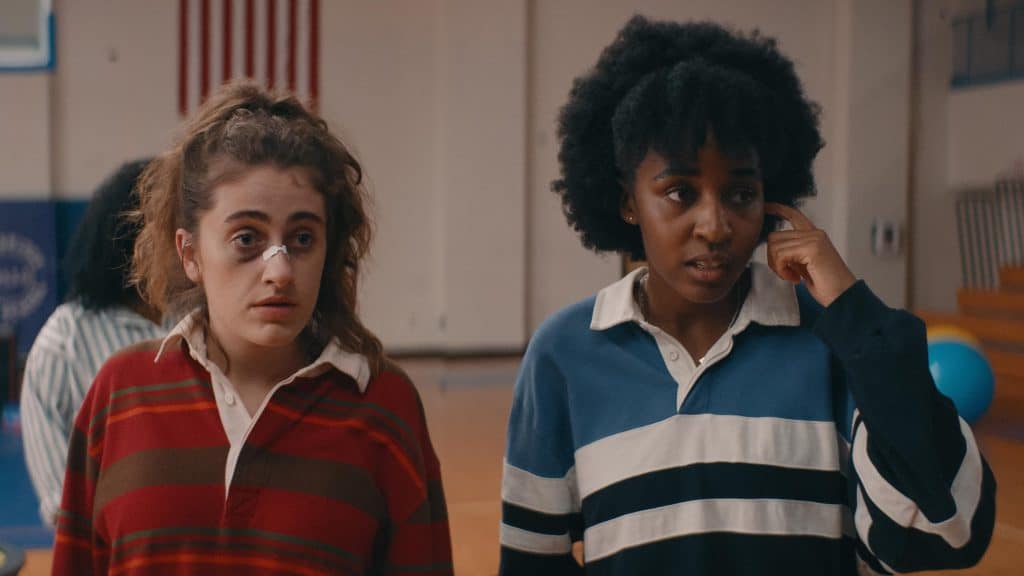
I know you were at the Bottoms premiere last night with one of your other actresses.
Yes! I was with Sabrina Jalees [who plays Paige], another really wonderful stand-up and another Canadian as well.
Real quick, what was your experience like?
Oh my god. What a wild ride. It was so singular. It was exactly what it should’ve been. It’s so itself. I’ve worked with Ayo before and I love her and I just thought her and Rachel were so great in it. I’ve always wanted to see a high school comedy that makes up for the fact that I, as a queer person, as a gay woman, didn’t have a silly high school comedy when I was in high school, so it feels like retribution for that in a really nice way. I just thought it was ridiculous and wild and so joyous.
In this film, there’s definitely a performance aspect to how Rachel embodies the character that you’ve written, but in Bottoms, it feels like she’s playing up her own comedic persona. What is it like working with a performer that’s so dynamic in that way?
It’s amazing. Rachel has range on range on range. She’s such a skilled actress that she can do it all. I think a lot of people know she can do the bombastic comedy, but she’s really great dramatically too, so I’m excited for people to see that side of her. I don’t think they’ll be surprised. Everyone will be like, “Well, that makes sense” She’s very good at comedy and it makes sense that she can walk this other line, too.
Last thing about Rachel––there’s a moment in the film where Sam takes a banana and dips it right in a jar of jelly. Can you unpack that?
We talked a lot about depression snacks, so we made a long list with the props department about what are the depression snacks that are littered around Sam’s house. We were like, “What’s a sad, sad snack?” And that was top of the list.
This film is very up front about the difficulties in being around the people who are connected to your trauma, and yet there still needs to be chemistry between the characters where they can go off on bits together and share this modern comedic sensibility. In that way, the comedy and tragedy are so interlinked. Can you speak to the balance of wanting to bring out the comedic relationships while also maneuvering around those relationships because of the trauma?
I think that the main goal with the film was to show what trauma can take away from you and how that is something that you can reclaim. You can reclaim joy and connection. Those things are still in the people that have PTSD, but they’re just not always at the forefront. I wanted to show that healing is not linear, there’s always going to be days that are lighter and darker and there’s going to be ups and downs in terms of recovery. That joy and despair can sometimes exist in the same moment or in the same day. I thought it was important to honor both because it’s just the way that life goes.
The film is having its World Premiere at SXSW. What are you most excited for in terms of this festival’s audience being the first to watch the film?
I think this audience, from what I’ve seen and what I’ve heard from people who have had their films premiere here, is very open to doing things in a new way. Although dramedies have existed for a while, I wanted to talk about trauma and recovery in a new way. Often when we talk about violence against women or female trauma, it’s often framed as a revenge thriller or it’s framed as a complete collapse of a life, like pure devastation and sorrow, and that’s just not the reality. Recovery is a very nuanced, nonlinear thing, so I wanted to take a different look at what it means to be a young woman in the world trying to heal for yourself but also intergenerationally. I think the tone of the film is something that I was missing when I was watching things. I hope audiences will be accepting of looking at this subject matter in a slightly new way.
I Used To Be Funny had its World Premiere at SXSW in the Narrative Feature Competition section. It is currently seeking US distribution.
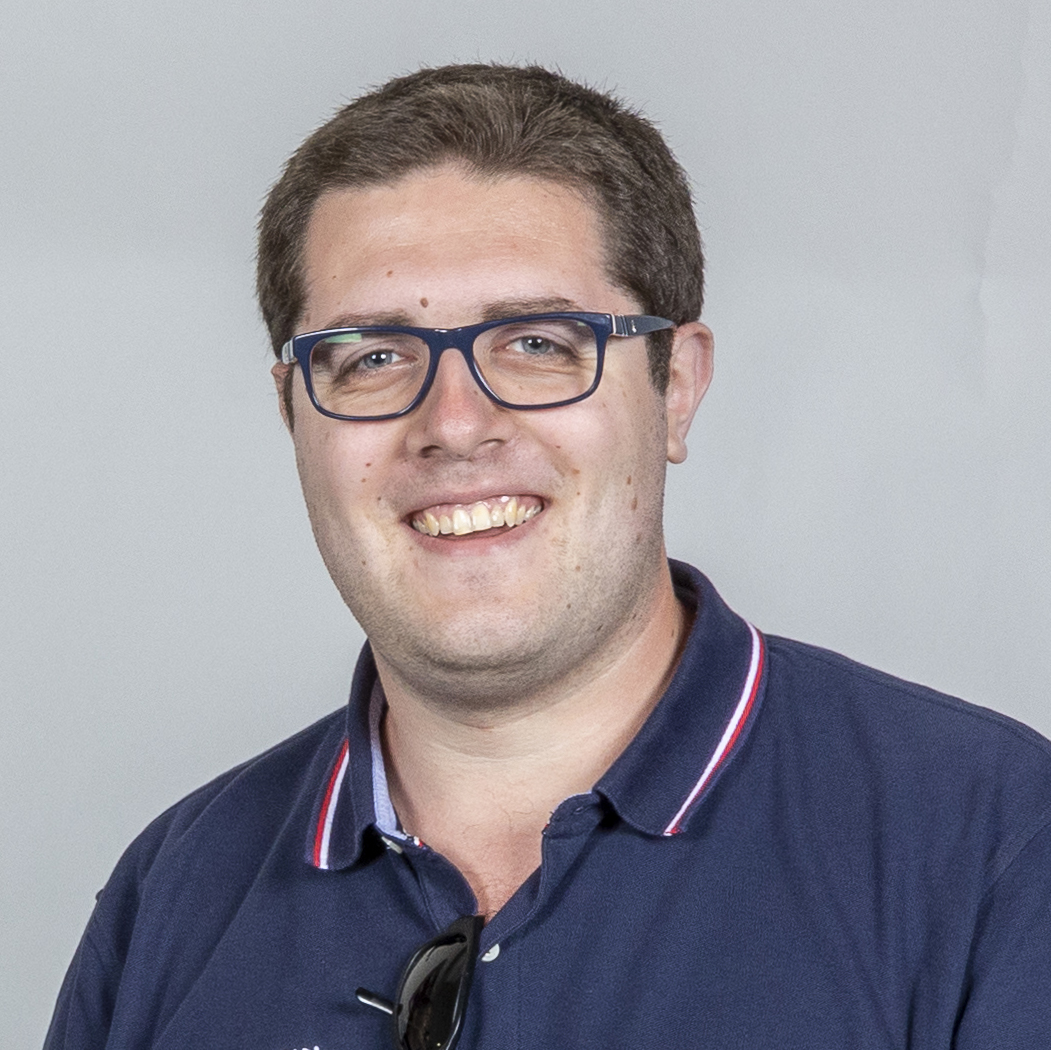
Larry Fried is a filmmaker, writer, and podcaster based in New Jersey. He is the host and creator of the podcast “My Favorite Movie is…,” a podcast dedicated to helping filmmakers make somebody’s next favorite movie. He is also the Visual Content Manager for Special Olympics New Jersey, an organization dedicated to competition and training opportunities for athletes with intellectual disabilities across the Garden State.


